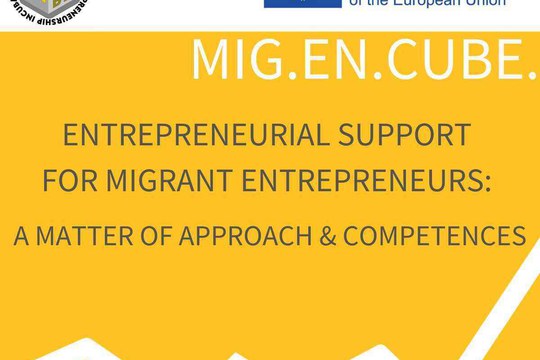Entrepreneurial support for migrant entrepreneurs: a matter of approach and competences
Besides the risks and challenges associated with launching a new business, migrants face additional barriers derived from being “outsiders” with respect to the local social and business networks.
The Erasmus Plus project MIG.EN.CUBE, co-funded by the European Union, has investigated how different types of entrepreneurial support organizations approach migrant entrepreneurs and how they source their knowledge and competencies. The study has investigated the experiences of 48 incubators in France, Italy, and The Netherlands; and collected survey information about the competencies and training needs of 105 entrepreneurial support organizations’ professionals across several European countries.
The interviews revealed three points of view about whether migrant and native entrepreneurs were perceived:
- “no difference” exists between native and migrant entrepreneurs.
- “exceptionalism” of migrant entrepreneurs due to their idiosyncratic advantages in grasping business opportunities and their diversity as a source of inspiration and reflection.
- consistent “gaps” regarding the understanding of the local institutional and regulatory framework, together with different cultures, worldviews, values, communication styles, and expectations.
Professionals working in entrepreneurial support organizations require both technical entrepreneurship- and business-related competencies, complemented by soft and interpersonal skills. The psychological dimension of entertaining relationships with entrepreneurs was emphasized.
One of the most important findings of the research is that entrepreneurial support organizations need to increase the formal training opportunities offered to their professionals. Intercultural competencies, equity, diversity and inclusion, and pedagogical approaches to training, tutoring, and mentoring should be further broadened, as well as formal training on topics such as social innovation, social entrepreneurship, impact finance, and microfinance.
Recommendations for managers of entrepreneurial support organizations
- More training for internal staff and external consultant/mentor in the domain of social competencies.
- More awareness of implicit power dynamics in their relationships with migrant entrepreneurs, in their programs, and in the surrounding ecosystem.
Recommendations for policy-makers:
- More inclusion of migrants in policy design and implementation and in funding decisions and entrepreneurial support organizations should enlarge the participation of migrants through the co-design and co-delivery of programs.
- More coordination of efforts among entrepreneurial support organizations’ professionals and other actors in the entrepreneurial ecosystems to develop effective solutions with complementary competencies and resources.
- More measurement: policy-makers and entrepreneurial support organizations should set clear goals for their policies and programs and acknowledge that migrant entrepreneurship activities are not welfare policies, although they could have the aim of enhancing integration in society and strengthening the shared culture in which migrants are a resource.
Read the full project report
This project has been funded with support from the European Commission. This publication reflects the views only of the author, and the Commission cannot be held responsible for any use which may be made of the information contained therein.

